Roles and Responsibilities in Maintaining Data Privacy in Australia
VerifiedAdded on 2023/01/20
|9
|2002
|77
Report
AI Summary
This report examines the roles and responsibilities of the Australian government, businesses, and individuals in maintaining data privacy. It explores the legal framework, including the Privacy Act and GDPR, and the actions each entity must take to protect data. The report highlights the similarities and differences in these roles, emphasizing the importance of removing personally identifiable data, training staff, and developing robust security policies. It contrasts the granular regulations imposed on the Australian government with the broader responsibilities of businesses and individuals. The report also discusses the concept of consent in data collection and processing, emphasizing the need for free and informed consent. The conclusion stresses the ongoing challenges in data protection and the need for continuous improvement in data privacy practices across all sectors. The report provides insights into how to improve techniques of maintaining data privacy, including the collection and use of data concerning clients.
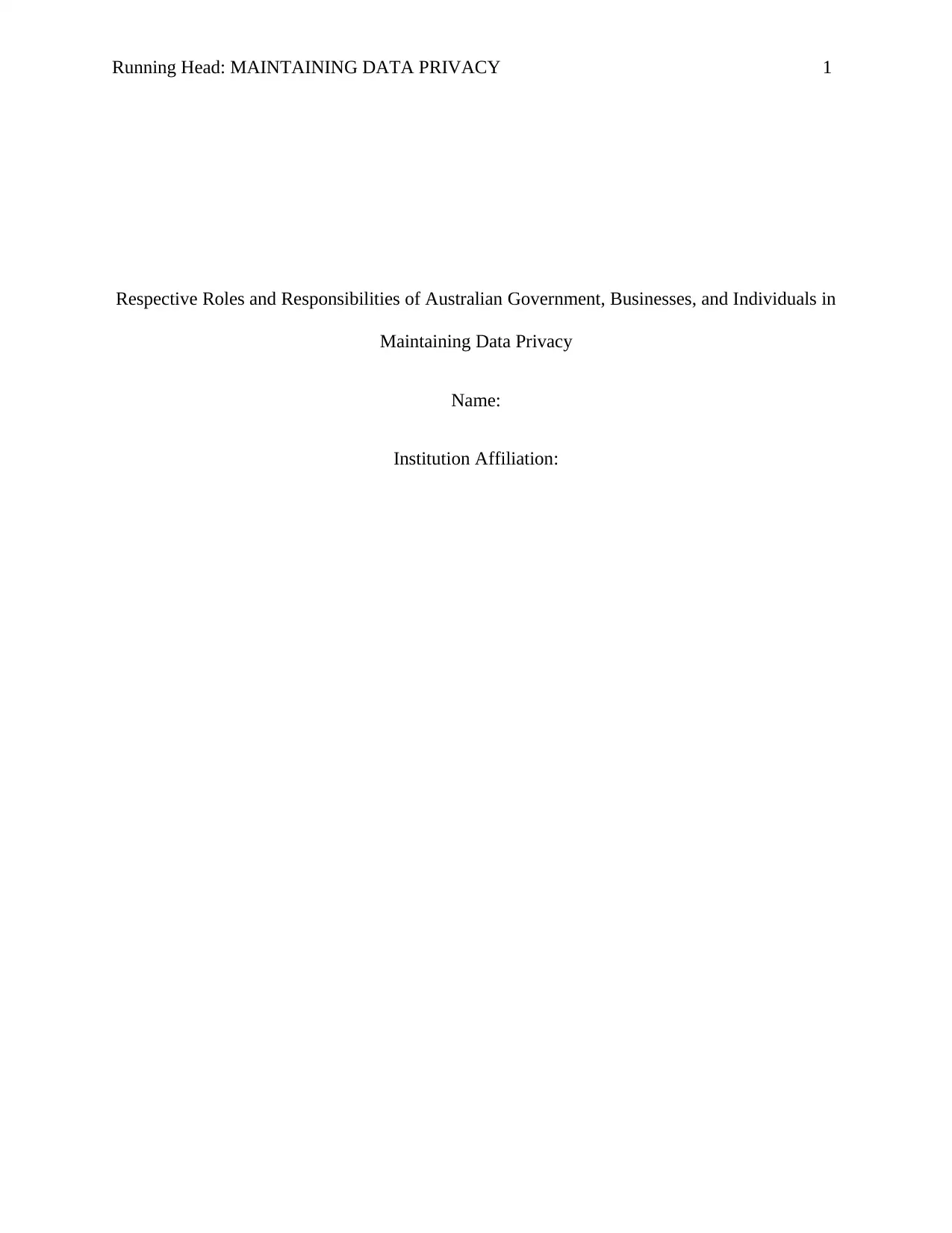
Running Head: MAINTAINING DATA PRIVACY 1
Respective Roles and Responsibilities of Australian Government, Businesses, and Individuals in
Maintaining Data Privacy
Name:
Institution Affiliation:
Respective Roles and Responsibilities of Australian Government, Businesses, and Individuals in
Maintaining Data Privacy
Name:
Institution Affiliation:
Paraphrase This Document
Need a fresh take? Get an instant paraphrase of this document with our AI Paraphraser
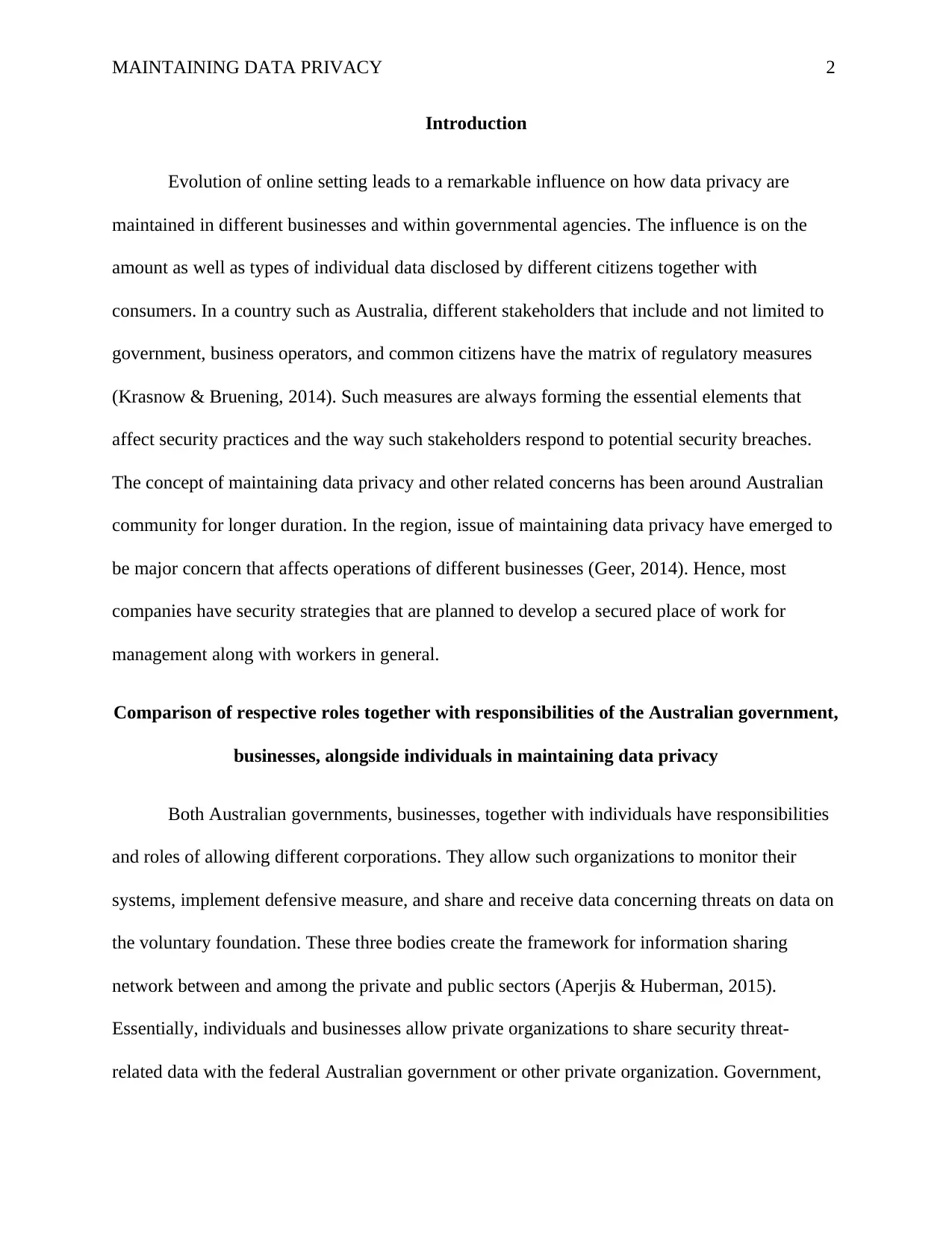
MAINTAINING DATA PRIVACY 2
Introduction
Evolution of online setting leads to a remarkable influence on how data privacy are
maintained in different businesses and within governmental agencies. The influence is on the
amount as well as types of individual data disclosed by different citizens together with
consumers. In a country such as Australia, different stakeholders that include and not limited to
government, business operators, and common citizens have the matrix of regulatory measures
(Krasnow & Bruening, 2014). Such measures are always forming the essential elements that
affect security practices and the way such stakeholders respond to potential security breaches.
The concept of maintaining data privacy and other related concerns has been around Australian
community for longer duration. In the region, issue of maintaining data privacy have emerged to
be major concern that affects operations of different businesses (Geer, 2014). Hence, most
companies have security strategies that are planned to develop a secured place of work for
management along with workers in general.
Comparison of respective roles together with responsibilities of the Australian government,
businesses, alongside individuals in maintaining data privacy
Both Australian governments, businesses, together with individuals have responsibilities
and roles of allowing different corporations. They allow such organizations to monitor their
systems, implement defensive measure, and share and receive data concerning threats on data on
the voluntary foundation. These three bodies create the framework for information sharing
network between and among the private and public sectors (Aperjis & Huberman, 2015).
Essentially, individuals and businesses allow private organizations to share security threat-
related data with the federal Australian government or other private organization. Government,
Introduction
Evolution of online setting leads to a remarkable influence on how data privacy are
maintained in different businesses and within governmental agencies. The influence is on the
amount as well as types of individual data disclosed by different citizens together with
consumers. In a country such as Australia, different stakeholders that include and not limited to
government, business operators, and common citizens have the matrix of regulatory measures
(Krasnow & Bruening, 2014). Such measures are always forming the essential elements that
affect security practices and the way such stakeholders respond to potential security breaches.
The concept of maintaining data privacy and other related concerns has been around Australian
community for longer duration. In the region, issue of maintaining data privacy have emerged to
be major concern that affects operations of different businesses (Geer, 2014). Hence, most
companies have security strategies that are planned to develop a secured place of work for
management along with workers in general.
Comparison of respective roles together with responsibilities of the Australian government,
businesses, alongside individuals in maintaining data privacy
Both Australian governments, businesses, together with individuals have responsibilities
and roles of allowing different corporations. They allow such organizations to monitor their
systems, implement defensive measure, and share and receive data concerning threats on data on
the voluntary foundation. These three bodies create the framework for information sharing
network between and among the private and public sectors (Aperjis & Huberman, 2015).
Essentially, individuals and businesses allow private organizations to share security threat-
related data with the federal Australian government or other private organization. Government,
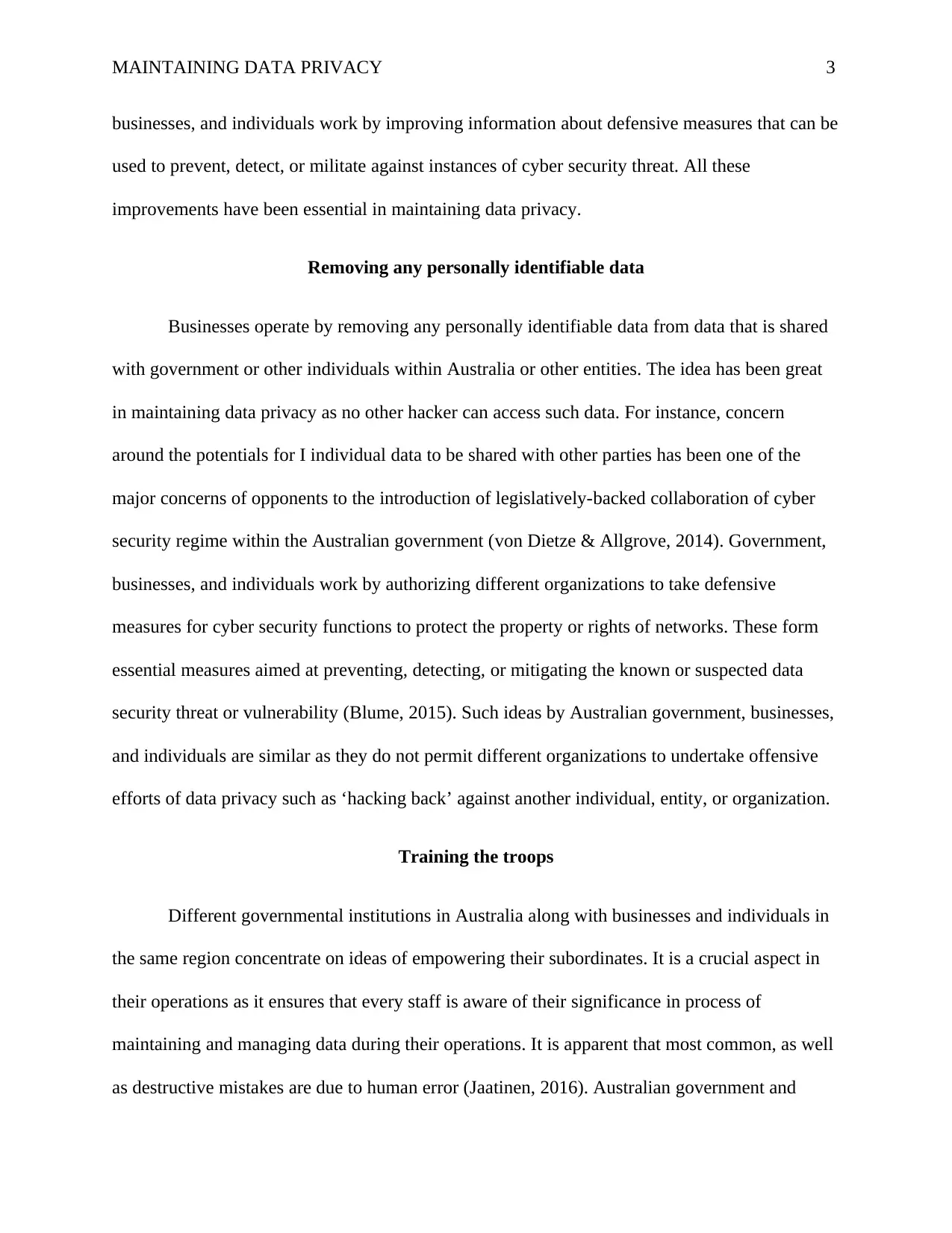
MAINTAINING DATA PRIVACY 3
businesses, and individuals work by improving information about defensive measures that can be
used to prevent, detect, or militate against instances of cyber security threat. All these
improvements have been essential in maintaining data privacy.
Removing any personally identifiable data
Businesses operate by removing any personally identifiable data from data that is shared
with government or other individuals within Australia or other entities. The idea has been great
in maintaining data privacy as no other hacker can access such data. For instance, concern
around the potentials for I individual data to be shared with other parties has been one of the
major concerns of opponents to the introduction of legislatively-backed collaboration of cyber
security regime within the Australian government (von Dietze & Allgrove, 2014). Government,
businesses, and individuals work by authorizing different organizations to take defensive
measures for cyber security functions to protect the property or rights of networks. These form
essential measures aimed at preventing, detecting, or mitigating the known or suspected data
security threat or vulnerability (Blume, 2015). Such ideas by Australian government, businesses,
and individuals are similar as they do not permit different organizations to undertake offensive
efforts of data privacy such as ‘hacking back’ against another individual, entity, or organization.
Training the troops
Different governmental institutions in Australia along with businesses and individuals in
the same region concentrate on ideas of empowering their subordinates. It is a crucial aspect in
their operations as it ensures that every staff is aware of their significance in process of
maintaining and managing data during their operations. It is apparent that most common, as well
as destructive mistakes are due to human error (Jaatinen, 2016). Australian government and
businesses, and individuals work by improving information about defensive measures that can be
used to prevent, detect, or militate against instances of cyber security threat. All these
improvements have been essential in maintaining data privacy.
Removing any personally identifiable data
Businesses operate by removing any personally identifiable data from data that is shared
with government or other individuals within Australia or other entities. The idea has been great
in maintaining data privacy as no other hacker can access such data. For instance, concern
around the potentials for I individual data to be shared with other parties has been one of the
major concerns of opponents to the introduction of legislatively-backed collaboration of cyber
security regime within the Australian government (von Dietze & Allgrove, 2014). Government,
businesses, and individuals work by authorizing different organizations to take defensive
measures for cyber security functions to protect the property or rights of networks. These form
essential measures aimed at preventing, detecting, or mitigating the known or suspected data
security threat or vulnerability (Blume, 2015). Such ideas by Australian government, businesses,
and individuals are similar as they do not permit different organizations to undertake offensive
efforts of data privacy such as ‘hacking back’ against another individual, entity, or organization.
Training the troops
Different governmental institutions in Australia along with businesses and individuals in
the same region concentrate on ideas of empowering their subordinates. It is a crucial aspect in
their operations as it ensures that every staff is aware of their significance in process of
maintaining and managing data during their operations. It is apparent that most common, as well
as destructive mistakes are due to human error (Jaatinen, 2016). Australian government and
⊘ This is a preview!⊘
Do you want full access?
Subscribe today to unlock all pages.

Trusted by 1+ million students worldwide
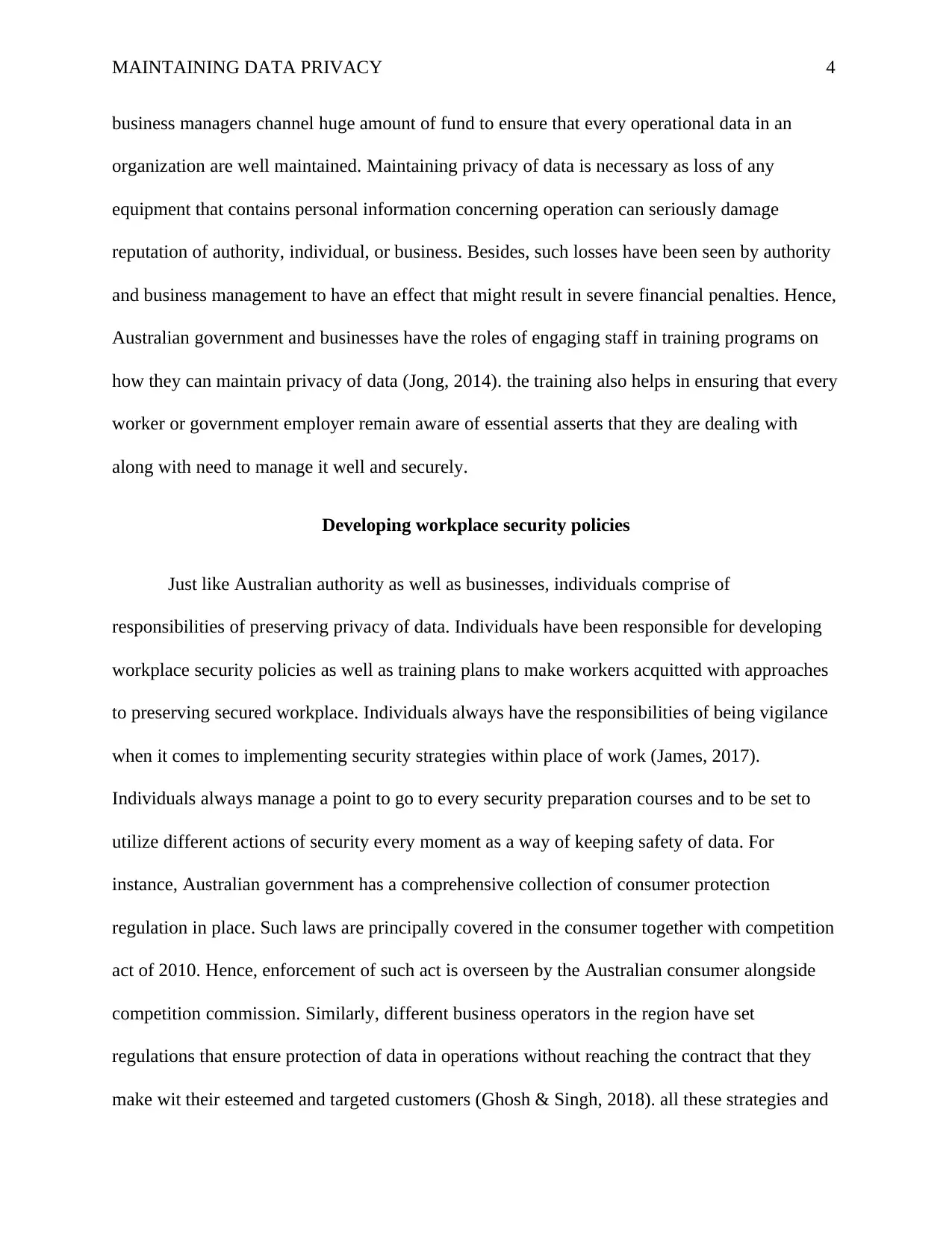
MAINTAINING DATA PRIVACY 4
business managers channel huge amount of fund to ensure that every operational data in an
organization are well maintained. Maintaining privacy of data is necessary as loss of any
equipment that contains personal information concerning operation can seriously damage
reputation of authority, individual, or business. Besides, such losses have been seen by authority
and business management to have an effect that might result in severe financial penalties. Hence,
Australian government and businesses have the roles of engaging staff in training programs on
how they can maintain privacy of data (Jong, 2014). the training also helps in ensuring that every
worker or government employer remain aware of essential asserts that they are dealing with
along with need to manage it well and securely.
Developing workplace security policies
Just like Australian authority as well as businesses, individuals comprise of
responsibilities of preserving privacy of data. Individuals have been responsible for developing
workplace security policies as well as training plans to make workers acquitted with approaches
to preserving secured workplace. Individuals always have the responsibilities of being vigilance
when it comes to implementing security strategies within place of work (James, 2017).
Individuals always manage a point to go to every security preparation courses and to be set to
utilize different actions of security every moment as a way of keeping safety of data. For
instance, Australian government has a comprehensive collection of consumer protection
regulation in place. Such laws are principally covered in the consumer together with competition
act of 2010. Hence, enforcement of such act is overseen by the Australian consumer alongside
competition commission. Similarly, different business operators in the region have set
regulations that ensure protection of data in operations without reaching the contract that they
make wit their esteemed and targeted customers (Ghosh & Singh, 2018). all these strategies and
business managers channel huge amount of fund to ensure that every operational data in an
organization are well maintained. Maintaining privacy of data is necessary as loss of any
equipment that contains personal information concerning operation can seriously damage
reputation of authority, individual, or business. Besides, such losses have been seen by authority
and business management to have an effect that might result in severe financial penalties. Hence,
Australian government and businesses have the roles of engaging staff in training programs on
how they can maintain privacy of data (Jong, 2014). the training also helps in ensuring that every
worker or government employer remain aware of essential asserts that they are dealing with
along with need to manage it well and securely.
Developing workplace security policies
Just like Australian authority as well as businesses, individuals comprise of
responsibilities of preserving privacy of data. Individuals have been responsible for developing
workplace security policies as well as training plans to make workers acquitted with approaches
to preserving secured workplace. Individuals always have the responsibilities of being vigilance
when it comes to implementing security strategies within place of work (James, 2017).
Individuals always manage a point to go to every security preparation courses and to be set to
utilize different actions of security every moment as a way of keeping safety of data. For
instance, Australian government has a comprehensive collection of consumer protection
regulation in place. Such laws are principally covered in the consumer together with competition
act of 2010. Hence, enforcement of such act is overseen by the Australian consumer alongside
competition commission. Similarly, different business operators in the region have set
regulations that ensure protection of data in operations without reaching the contract that they
make wit their esteemed and targeted customers (Ghosh & Singh, 2018). all these strategies and
Paraphrase This Document
Need a fresh take? Get an instant paraphrase of this document with our AI Paraphraser
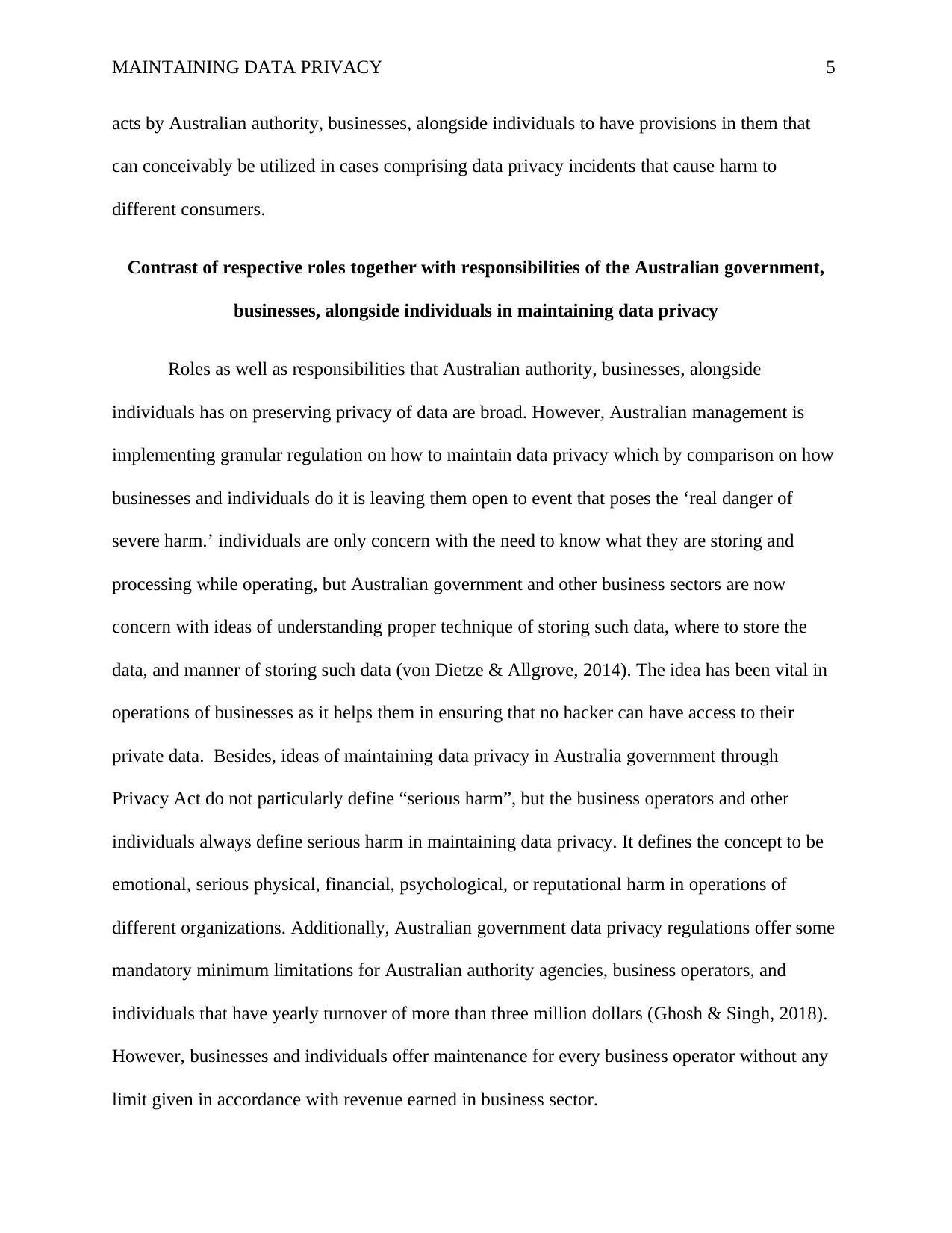
MAINTAINING DATA PRIVACY 5
acts by Australian authority, businesses, alongside individuals to have provisions in them that
can conceivably be utilized in cases comprising data privacy incidents that cause harm to
different consumers.
Contrast of respective roles together with responsibilities of the Australian government,
businesses, alongside individuals in maintaining data privacy
Roles as well as responsibilities that Australian authority, businesses, alongside
individuals has on preserving privacy of data are broad. However, Australian management is
implementing granular regulation on how to maintain data privacy which by comparison on how
businesses and individuals do it is leaving them open to event that poses the ‘real danger of
severe harm.’ individuals are only concern with the need to know what they are storing and
processing while operating, but Australian government and other business sectors are now
concern with ideas of understanding proper technique of storing such data, where to store the
data, and manner of storing such data (von Dietze & Allgrove, 2014). The idea has been vital in
operations of businesses as it helps them in ensuring that no hacker can have access to their
private data. Besides, ideas of maintaining data privacy in Australia government through
Privacy Act do not particularly define “serious harm”, but the business operators and other
individuals always define serious harm in maintaining data privacy. It defines the concept to be
emotional, serious physical, financial, psychological, or reputational harm in operations of
different organizations. Additionally, Australian government data privacy regulations offer some
mandatory minimum limitations for Australian authority agencies, business operators, and
individuals that have yearly turnover of more than three million dollars (Ghosh & Singh, 2018).
However, businesses and individuals offer maintenance for every business operator without any
limit given in accordance with revenue earned in business sector.
acts by Australian authority, businesses, alongside individuals to have provisions in them that
can conceivably be utilized in cases comprising data privacy incidents that cause harm to
different consumers.
Contrast of respective roles together with responsibilities of the Australian government,
businesses, alongside individuals in maintaining data privacy
Roles as well as responsibilities that Australian authority, businesses, alongside
individuals has on preserving privacy of data are broad. However, Australian management is
implementing granular regulation on how to maintain data privacy which by comparison on how
businesses and individuals do it is leaving them open to event that poses the ‘real danger of
severe harm.’ individuals are only concern with the need to know what they are storing and
processing while operating, but Australian government and other business sectors are now
concern with ideas of understanding proper technique of storing such data, where to store the
data, and manner of storing such data (von Dietze & Allgrove, 2014). The idea has been vital in
operations of businesses as it helps them in ensuring that no hacker can have access to their
private data. Besides, ideas of maintaining data privacy in Australia government through
Privacy Act do not particularly define “serious harm”, but the business operators and other
individuals always define serious harm in maintaining data privacy. It defines the concept to be
emotional, serious physical, financial, psychological, or reputational harm in operations of
different organizations. Additionally, Australian government data privacy regulations offer some
mandatory minimum limitations for Australian authority agencies, business operators, and
individuals that have yearly turnover of more than three million dollars (Ghosh & Singh, 2018).
However, businesses and individuals offer maintenance for every business operator without any
limit given in accordance with revenue earned in business sector.
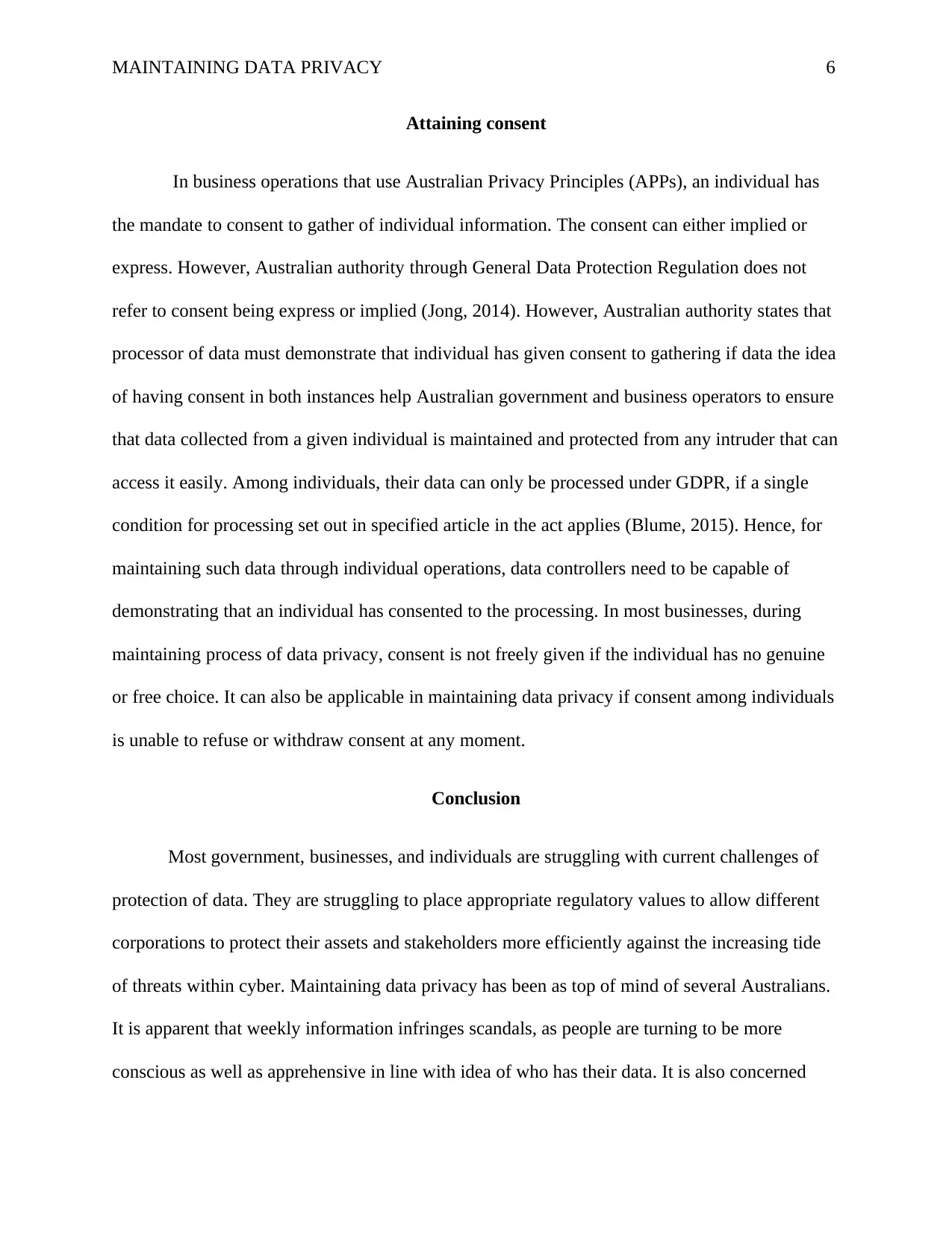
MAINTAINING DATA PRIVACY 6
Attaining consent
In business operations that use Australian Privacy Principles (APPs), an individual has
the mandate to consent to gather of individual information. The consent can either implied or
express. However, Australian authority through General Data Protection Regulation does not
refer to consent being express or implied (Jong, 2014). However, Australian authority states that
processor of data must demonstrate that individual has given consent to gathering if data the idea
of having consent in both instances help Australian government and business operators to ensure
that data collected from a given individual is maintained and protected from any intruder that can
access it easily. Among individuals, their data can only be processed under GDPR, if a single
condition for processing set out in specified article in the act applies (Blume, 2015). Hence, for
maintaining such data through individual operations, data controllers need to be capable of
demonstrating that an individual has consented to the processing. In most businesses, during
maintaining process of data privacy, consent is not freely given if the individual has no genuine
or free choice. It can also be applicable in maintaining data privacy if consent among individuals
is unable to refuse or withdraw consent at any moment.
Conclusion
Most government, businesses, and individuals are struggling with current challenges of
protection of data. They are struggling to place appropriate regulatory values to allow different
corporations to protect their assets and stakeholders more efficiently against the increasing tide
of threats within cyber. Maintaining data privacy has been as top of mind of several Australians.
It is apparent that weekly information infringes scandals, as people are turning to be more
conscious as well as apprehensive in line with idea of who has their data. It is also concerned
Attaining consent
In business operations that use Australian Privacy Principles (APPs), an individual has
the mandate to consent to gather of individual information. The consent can either implied or
express. However, Australian authority through General Data Protection Regulation does not
refer to consent being express or implied (Jong, 2014). However, Australian authority states that
processor of data must demonstrate that individual has given consent to gathering if data the idea
of having consent in both instances help Australian government and business operators to ensure
that data collected from a given individual is maintained and protected from any intruder that can
access it easily. Among individuals, their data can only be processed under GDPR, if a single
condition for processing set out in specified article in the act applies (Blume, 2015). Hence, for
maintaining such data through individual operations, data controllers need to be capable of
demonstrating that an individual has consented to the processing. In most businesses, during
maintaining process of data privacy, consent is not freely given if the individual has no genuine
or free choice. It can also be applicable in maintaining data privacy if consent among individuals
is unable to refuse or withdraw consent at any moment.
Conclusion
Most government, businesses, and individuals are struggling with current challenges of
protection of data. They are struggling to place appropriate regulatory values to allow different
corporations to protect their assets and stakeholders more efficiently against the increasing tide
of threats within cyber. Maintaining data privacy has been as top of mind of several Australians.
It is apparent that weekly information infringes scandals, as people are turning to be more
conscious as well as apprehensive in line with idea of who has their data. It is also concerned
⊘ This is a preview!⊘
Do you want full access?
Subscribe today to unlock all pages.

Trusted by 1+ million students worldwide
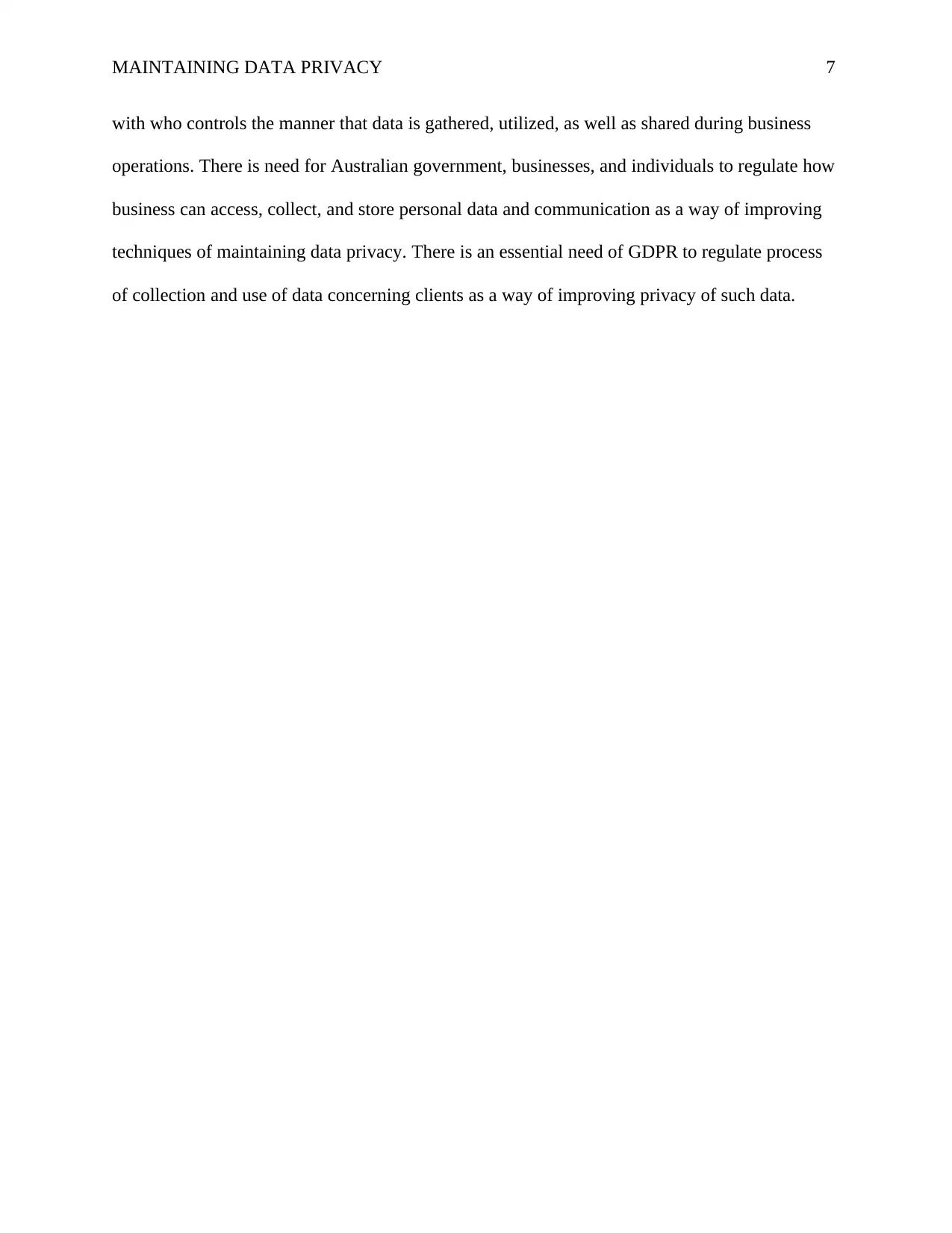
MAINTAINING DATA PRIVACY 7
with who controls the manner that data is gathered, utilized, as well as shared during business
operations. There is need for Australian government, businesses, and individuals to regulate how
business can access, collect, and store personal data and communication as a way of improving
techniques of maintaining data privacy. There is an essential need of GDPR to regulate process
of collection and use of data concerning clients as a way of improving privacy of such data.
with who controls the manner that data is gathered, utilized, as well as shared during business
operations. There is need for Australian government, businesses, and individuals to regulate how
business can access, collect, and store personal data and communication as a way of improving
techniques of maintaining data privacy. There is an essential need of GDPR to regulate process
of collection and use of data concerning clients as a way of improving privacy of such data.
Paraphrase This Document
Need a fresh take? Get an instant paraphrase of this document with our AI Paraphraser
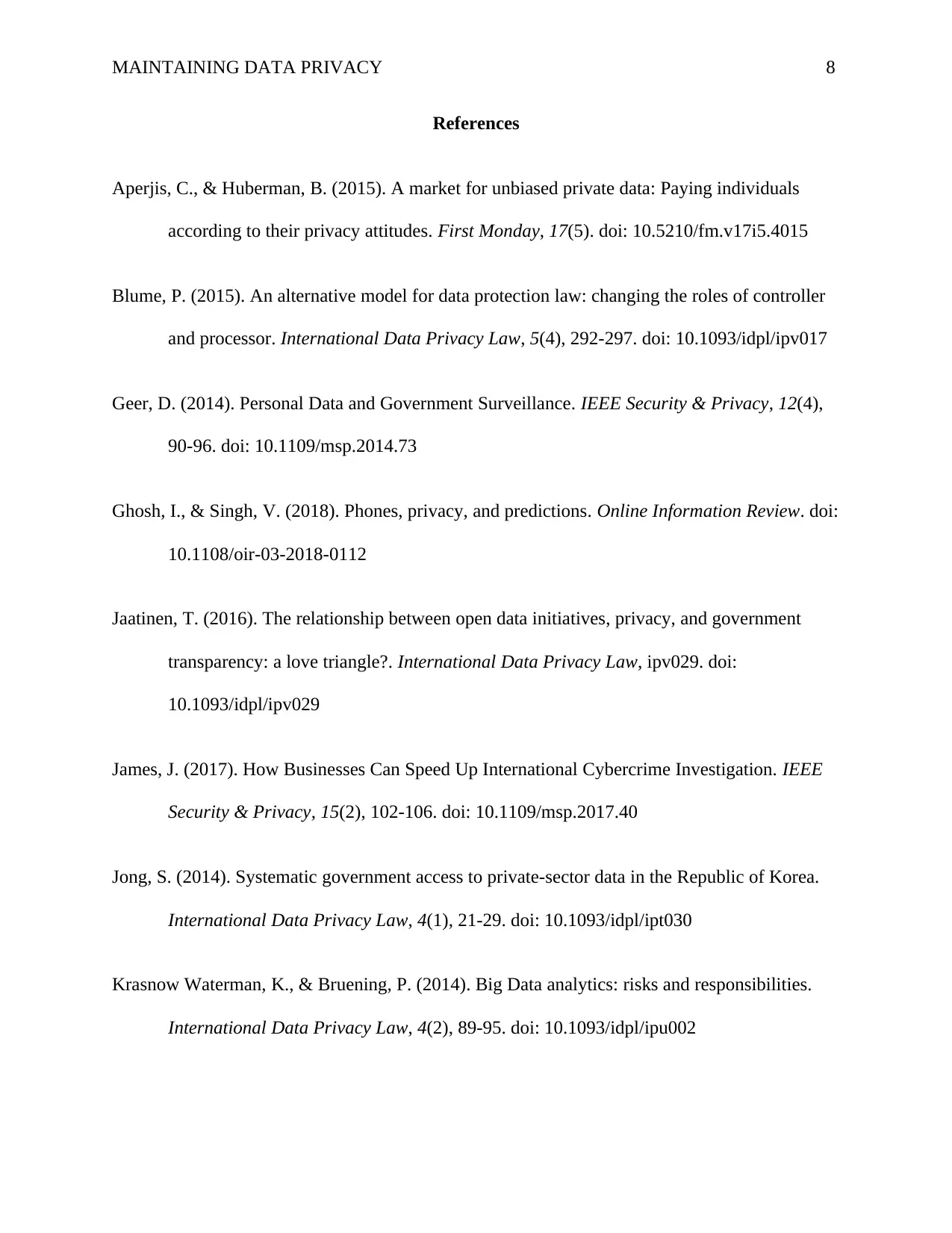
MAINTAINING DATA PRIVACY 8
References
Aperjis, C., & Huberman, B. (2015). A market for unbiased private data: Paying individuals
according to their privacy attitudes. First Monday, 17(5). doi: 10.5210/fm.v17i5.4015
Blume, P. (2015). An alternative model for data protection law: changing the roles of controller
and processor. International Data Privacy Law, 5(4), 292-297. doi: 10.1093/idpl/ipv017
Geer, D. (2014). Personal Data and Government Surveillance. IEEE Security & Privacy, 12(4),
90-96. doi: 10.1109/msp.2014.73
Ghosh, I., & Singh, V. (2018). Phones, privacy, and predictions. Online Information Review. doi:
10.1108/oir-03-2018-0112
Jaatinen, T. (2016). The relationship between open data initiatives, privacy, and government
transparency: a love triangle?. International Data Privacy Law, ipv029. doi:
10.1093/idpl/ipv029
James, J. (2017). How Businesses Can Speed Up International Cybercrime Investigation. IEEE
Security & Privacy, 15(2), 102-106. doi: 10.1109/msp.2017.40
Jong, S. (2014). Systematic government access to private-sector data in the Republic of Korea.
International Data Privacy Law, 4(1), 21-29. doi: 10.1093/idpl/ipt030
Krasnow Waterman, K., & Bruening, P. (2014). Big Data analytics: risks and responsibilities.
International Data Privacy Law, 4(2), 89-95. doi: 10.1093/idpl/ipu002
References
Aperjis, C., & Huberman, B. (2015). A market for unbiased private data: Paying individuals
according to their privacy attitudes. First Monday, 17(5). doi: 10.5210/fm.v17i5.4015
Blume, P. (2015). An alternative model for data protection law: changing the roles of controller
and processor. International Data Privacy Law, 5(4), 292-297. doi: 10.1093/idpl/ipv017
Geer, D. (2014). Personal Data and Government Surveillance. IEEE Security & Privacy, 12(4),
90-96. doi: 10.1109/msp.2014.73
Ghosh, I., & Singh, V. (2018). Phones, privacy, and predictions. Online Information Review. doi:
10.1108/oir-03-2018-0112
Jaatinen, T. (2016). The relationship between open data initiatives, privacy, and government
transparency: a love triangle?. International Data Privacy Law, ipv029. doi:
10.1093/idpl/ipv029
James, J. (2017). How Businesses Can Speed Up International Cybercrime Investigation. IEEE
Security & Privacy, 15(2), 102-106. doi: 10.1109/msp.2017.40
Jong, S. (2014). Systematic government access to private-sector data in the Republic of Korea.
International Data Privacy Law, 4(1), 21-29. doi: 10.1093/idpl/ipt030
Krasnow Waterman, K., & Bruening, P. (2014). Big Data analytics: risks and responsibilities.
International Data Privacy Law, 4(2), 89-95. doi: 10.1093/idpl/ipu002
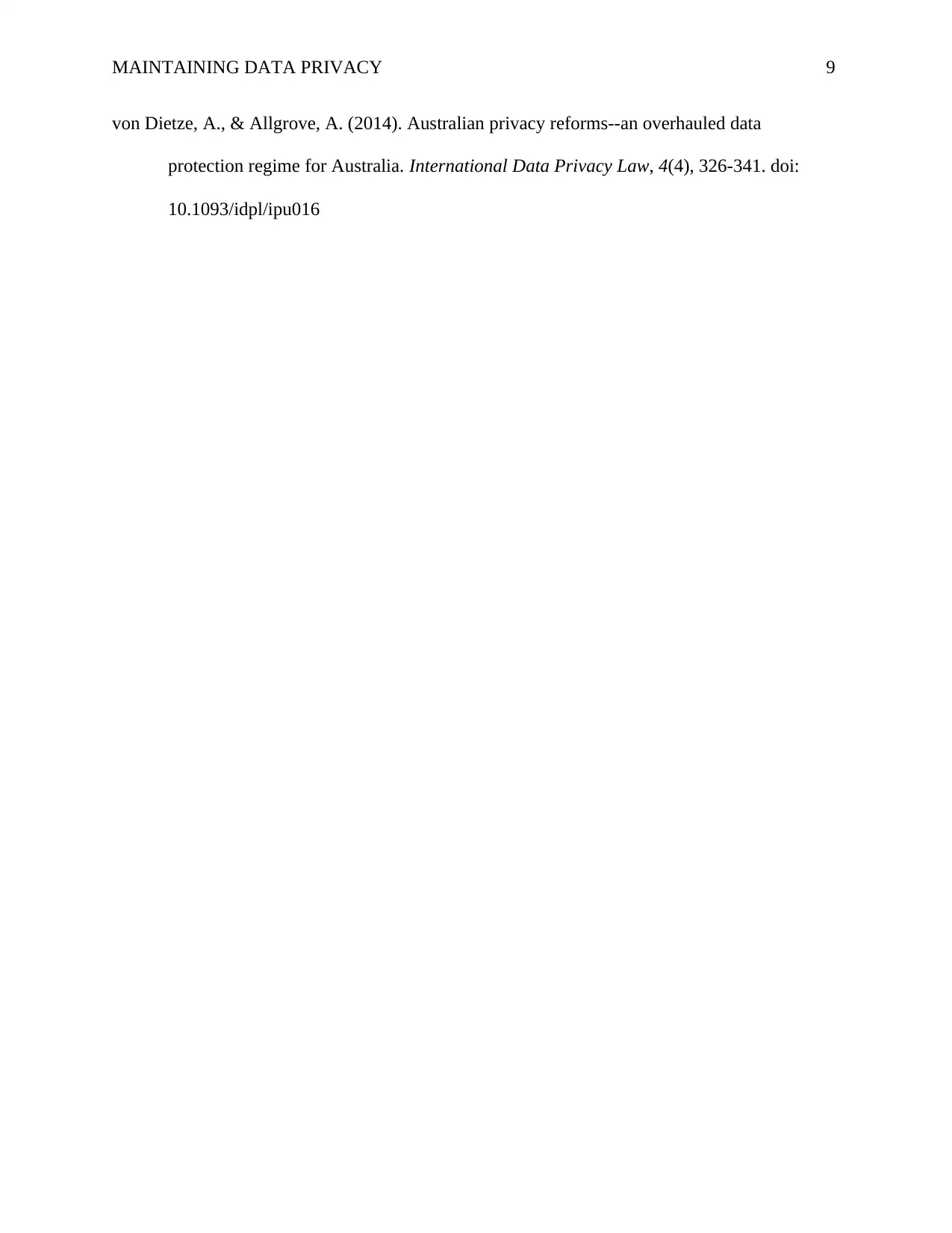
MAINTAINING DATA PRIVACY 9
von Dietze, A., & Allgrove, A. (2014). Australian privacy reforms--an overhauled data
protection regime for Australia. International Data Privacy Law, 4(4), 326-341. doi:
10.1093/idpl/ipu016
von Dietze, A., & Allgrove, A. (2014). Australian privacy reforms--an overhauled data
protection regime for Australia. International Data Privacy Law, 4(4), 326-341. doi:
10.1093/idpl/ipu016
⊘ This is a preview!⊘
Do you want full access?
Subscribe today to unlock all pages.

Trusted by 1+ million students worldwide
1 out of 9
Related Documents
Your All-in-One AI-Powered Toolkit for Academic Success.
+13062052269
info@desklib.com
Available 24*7 on WhatsApp / Email
![[object Object]](/_next/static/media/star-bottom.7253800d.svg)
Unlock your academic potential
Copyright © 2020–2026 A2Z Services. All Rights Reserved. Developed and managed by ZUCOL.




